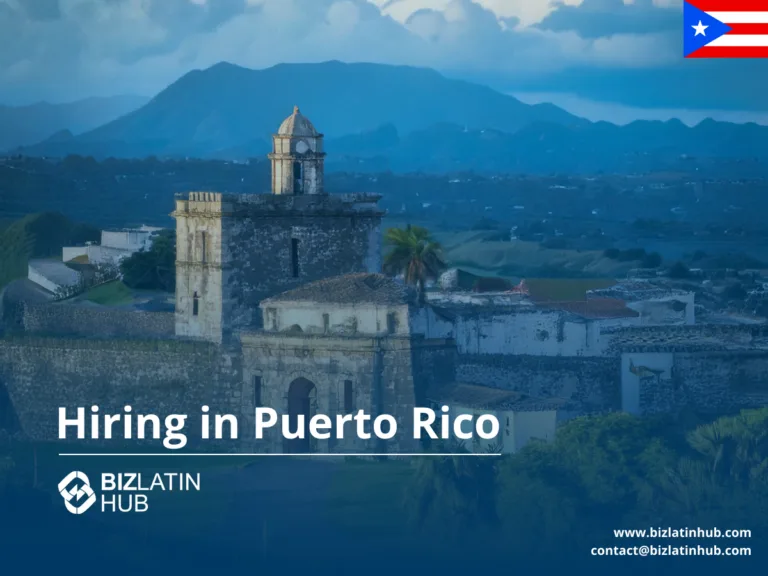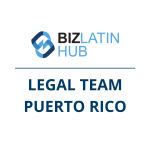Hiring in Puerto Rico presents distinct challenges and opportunities. As businesses seek talent, understanding the local landscape is crucial for success after company formation in Puerto Rico. The island has its own set of employment laws that differ from the U.S. mainland. Act 60, which promotes economic development, plays a significant role in shaping the hiring process. This guide outlines the essential steps for direct hiring and explains how a Professional Employer Organization (PEO) can simplify the process.
Key Takeaways: Hiring Employees in Puerto Rico
| What are the two main ways to hire an employee in Puerto Rico? | Through direct hiring after company formation or via PEO/EOR services. |
| Why use a PEO/EOR in Puerto Rico? | A PEO/EOR can manage all HR and compliance without a local entity. |
| What are the main statutory payroll taxes and contributions? | Employers cover Medicare and Social Security through FICA, as well as unemployment tax. |
| Are there any benefits that differ from the mainland U.S? | A Christmas bonus (Bono de Navidad) is a mandatory benefit. |
| What are the requirements for registering as an employer? | You must register your business and obtain an employer identification number from multiple government agencies. |
Key Requirements for Hiring Employees in Puerto Rico
1. Register as an Employer
You must register your business and obtain an employer identification number from multiple government agencies, including the Department of Labor and the Department of Treasury.
Expert Tip: The Multiple Agency Registration Process
From our experience, new employers are often surprised that registering as an employer in Puerto Rico requires filing with multiple government agencies, not just one. You must register with the Department of Labor and Human Resources for unemployment insurance, the State Insurance Fund Corporation for workers’ compensation insurance, and the Department of Treasury (Hacienda) for payroll taxes.
Each has its own process. We advise clients to treat these as three separate but simultaneous steps and to start the process well in advance of their first employee’s start date to ensure all accounts are active in time for the first payroll run.
2. Comply with Wage, Hour, and Leave Laws
Employers must pay at least the minimum wage and adhere to rules regarding overtime pay. They must also provide statutory paid leave for vacation, sickness, and public holidays.
3. Manage Payroll Taxes and Contributions
Employers must withhold and remit various payroll taxes, including federal social security and Medicare, and both federal and state unemployment insurance taxes.
4. Provide Mandatory Benefits
In addition to leave, employers are legally required to provide workers’ compensation insurance and pay an annual Christmas Bonus to all eligible employees.
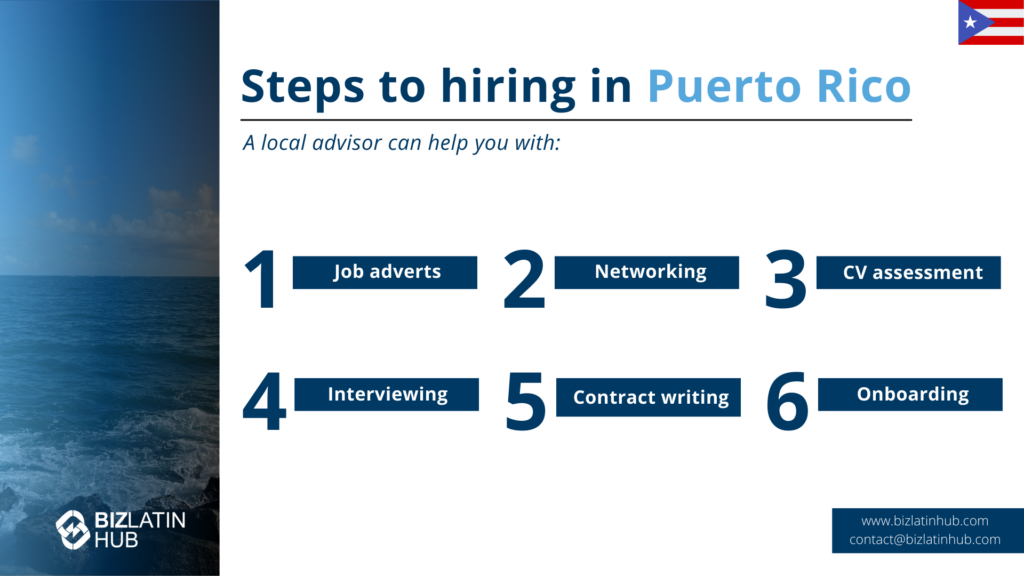
Effective Recruitment Strategies for Puerto Rico
Hiring in Puerto Rico offers businesses a chance to tap into a highly educated and bilingual workforce. Many professionals on the island are fluent in both Spanish and English, making them ideal candidates for companies needing these skills. The economic benefits, such as strategic location, tax incentives, and lower operational costs, make Puerto Rico an attractive location for U.S. companies.
Utilizing Local Job Boards and Agencies
Companies can leverage popular job boards like Clasificados Online and Indeed Puerto Rico to post job openings. These platforms provide better visibility to potential candidates. Recruitment agencies, including Kelly Services and Manpower, help speed up the hiring process by connecting employers with qualified candidates for both temporary and permanent roles. Partnering with local universities offers access to fresh graduates through internships and job fairs. The Puerto Rico Department of Labor’s job bank is a free tool for employers to find job seekers and assess resumes. Businesses can also engage with government programs like Juvempleo to employ young adults who are still in school, tapping into a motivated workforce.
List: Resources for Recruitment
- Clasificados Online
- Indeed Puerto Rico
- Kelly Services
- Manpower
- Puerto Rico Department of Labor’s Job Bank
- Juvempleo
Leveraging Social Media for Recruitment
Social media platforms such as LinkedIn, Facebook, and Instagram are crucial for attracting new talent. Job postings on these sites can gain wider exposure through likes and shares, reaching followers and their networks. Most social media platforms allow free job postings, with options for paid ads to enhance visibility further. Using hashtags in job postings can extend reach. Social media also facilitates interaction with potential candidates, improving engagement during recruitment.
Table: Social Media Features for Recruitment
| Platform | Feature | Benefit |
|---|---|---|
| Professional networking | Targets industry-specific talent | |
| Community engagement | Increases reach through shares | |
| Visual storytelling | Attracts younger demographics |
Puerto Rican Employment Laws
Puerto Rico has specific employment laws that protect employee rights. After one year of service, employees receive mandatory paid annual leave. Act No. 41-2022 enhances employee compensation and protections in the private sector. This includes vacation and sick leave accruals. Employers must provide a one-hour paid meal break after six consecutive hours of work. While written contracts are not required, they help clarify employment terms. Overtime pay applies for work beyond 40 hours a week at 1.5 times the regular wage.
Differences Between U.S. and Puerto Rican Employment Laws
Though U.S. employment laws apply in Puerto Rico, the island adds extra worker protections. Employees get two weeks of paid leave after a year of service. This benefit goes beyond what is standard in the mainland U.S. Labor laws require a one-hour paid meal break after six hours. The Labor Transformation and Flexibility Act brought flexible employment terms differing from traditional U.S. standards. Act No. 41-2022 revises 2017 labor reforms, enhancing workplace protections and leave accruals.
Understanding Act 60 and Its Implications
Act 60 obligates certain businesses to hire a full-time Puerto Rican resident. This requirement is for businesses with at least $3,000,000 in annual revenue. It reflects economic progress in Puerto Rico. Employers must keep informed about Act No. 41-2022, which improves employee protections. Work hours in Puerto Rico are 40 hours per week. The hiring process is streamlined, offering a skilled workforce and tax incentives for businesses.
Employers in Puerto Rico must understand payroll requirements clearly. They pay a 7.65% FICA tax. This covers Medicare and Social Security for employees. FICA contributions are deducted from employee wages every pay period. Employer obligations include Puerto Rico unemployment tax.
Here’s a breakdown:
| Tax Type | Rate | Details |
|---|---|---|
| FICA Tax | 7.65% | Covers Medicare and Social Security |
| Puerto Rico Unemployment | 5.6% | Applies to the first $7,000 of each employee’s wages |
Additionally, employers pay a 0.6% FUTA tax on the first $7,000, after a 5.4% credit. Severance payments face deductions for Medicare and Social Security. However, these payments are exempt from federal and local income taxes.
Key Points:
- Employers deduct FICA from wages each pay period.
- Severance payments include Medicare and Social Security but not income taxes.
Understanding these requirements ensures compliance with Puerto Rico’s regulations. Proper payroll management protects both employers and employees.
Employee Benefits in Puerto Rico
Employees in Puerto Rico receive several mandatory benefits set by labor laws. These include paid leave, sick days, and maternity leave. Employees working at least 130 hours a month earn vacation. They start with 0.5 days per month in the first year, increasing as they stay longer. Employers must provide Social Security and Medicare. They should also offer unemployment and disability insurance. Additionally, legal leave requirements are part of the benefits. Employers can offer extra benefits like health insurance or childcare support. Workers earn a one-hour meal break after six hours of work, which local law requires.
Annual Leave Policies
Full-time workers in Puerto Rico get six days of annual leave after a year. Senior employees can earn up to 15 days after 15 years. This leave includes public holidays and American holidays, totaling 19. Leave accrues at 1.25 days per month, if employees work 115+ hours that month. Employers must manage leave per local labor laws. Often, they use an Employer of Record (EOR) to handle this. Puerto Rico also provides paid sick leave apart from annual leave. Sick leave adds up to 12 days a year, with one day earned each month.
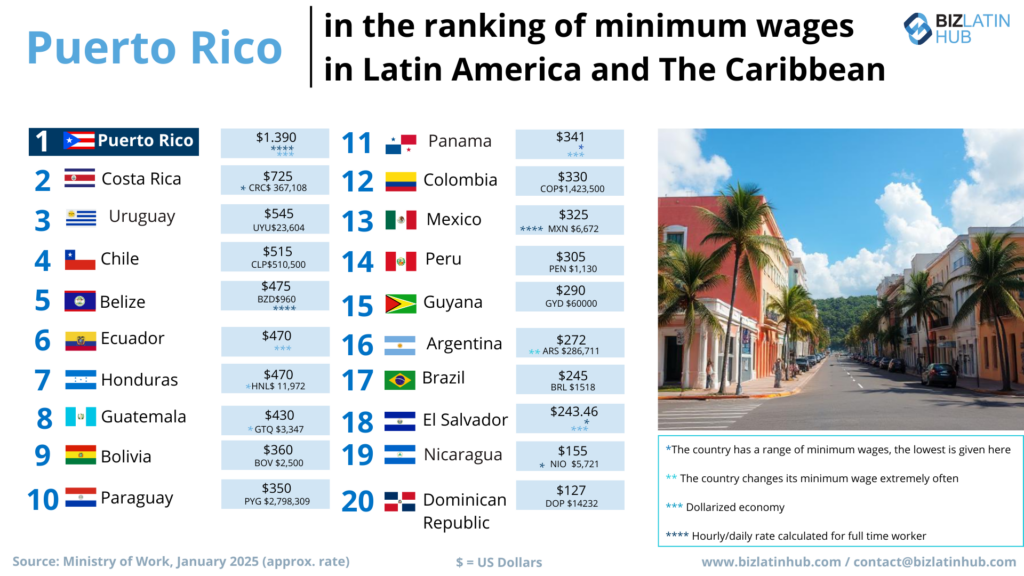
Sick Leave Regulations
Employees earn one day of paid sick leave for each month worked. This reaches up to 12 days annually. Sick leave starts from the probationary period. Workers must work 32.5 hours per week to earn this leave. Employees can use up to five medical leave days for family care. Sick leave pay matches the regular hourly rate of that month. Special rules apply if workers earn based on commissions or incentives.
Maternity and Adoption Leave
Maternity leave in Puerto Rico is eight weeks. It includes four weeks before and after childbirth with full pay. In special cases, an extra 12 weeks of unpaid leave exists for complications. Adoptive mothers of children under six get the same eight weeks leave. Nursing mothers get unpaid breaks for breastfeeding, totaling one hour each day. Employees must notify employers 30 days before adopting. They must prove the adoption process for five weeks of paid leave.
Wage Structures and Compensation Trends
In Puerto Rico, the wage structure is governed by a series of laws and regulations. The current minimum wage is $10.50 per hour, applicable to all sectors. This is higher than the federal minimum wage of $7.25 per hour. Employers with over 20 employees must pay a mandatory bonus, which is 2% of the employee’s annual salary, capped at $600 if they work at least 1,350 hours in a fiscal year.
Employers are also required to maintain detailed records for non-exempt employees. This includes timesheets that provide a clear picture of hours worked and wages earned. The revisions under Act No. 41-2022 have changed employee compensation and benefits, impacting annual bonuses and leave accruals.
Additionally, employers in Puerto Rico bear extra payroll costs, approximately 13.75% of an employee’s salary. These costs include Social Security contributions and other necessary employee benefits.
Minimum Wage Regulations
As of January 1, 2024, the minimum wage in Puerto Rico is set at USD$10.50 per hour. This change is part of the Puerto Rico Oversight, Management, and Economic Stability Act (PROMESA). The Act outlines specific changes to the Fair Labor Standards Act for Puerto Rican workers.
All employees must receive at least the federal minimum wage, but local laws establish the wage at a higher rate. Some industries may have different standards, so employers must stay informed to comply with wage rate regulations. The minimum wage laws in Puerto Rico also cover overtime pay for work that exceeds 40 hours a week.
Benefits as Part of Compensation Packages
Statutory benefits are a legal requirement for employers in Puerto Rico. These benefits include vacation time, paid leave, and compensation for medical and disability expenses from traffic accidents. Employers also provide additional benefits like paid vacation days, health insurance, education assistance, wellness programs, and childcare support.
The law requires a Christmas bonus for employees, which varies between 2% to 6% of their wages, not exceeding $600. Additionally, employees accumulate one day of paid sick leave per month, totaling up to 12 days per year, supplementing the unpaid leave per the Family and Medical Leave Act (FMLA).
Pregnant employees are entitled to eight weeks of paid maternity leave, divided equally before and after childbirth. Public sector employees receive 16 weeks of maternity leave, showing enhanced protections for workers.
Compensation Summary
| Item | Description |
|---|---|
| Minimum Wage | $10.50 per hour (as of January 1, 2024) |
| Mandatory Bonus | 2% of annual salary, up to $600, for eligible workers |
| Additional Payroll Costs | 13.75% of employee salary |
| Sick Leave | 1 day per month, up to 12 days per year |
| Maternity Leave | 8 weeks paid (16 for public sector) |
This table highlights the key aspects of compensation and wage policies in Puerto Rico. Employers must consider these when planning salaries and benefits packages for their workforce.
Using a PEO as a Hiring Solution
A Professional Employer Organization (PEO) in Puerto Rico acts as the legal employer for workers. It ensures compliance with local labor laws and simplifies the hiring process for businesses without local incorporation. The PEO manages employment compliance. It ensures that all employment contracts align with Puerto Rico’s labor regulations. Payroll management is a key function of the PEO. They handle the calculation, processing, and distribution of employee salaries in line with payroll laws.
The PEO also takes care of tax filing and contributions. It registers, files, and pays employer taxes and social security contributions to the appropriate authorities. By utilizing an PEO, businesses can reduce the time associated with onboarding employees. This ensures adherence to legal requirements.
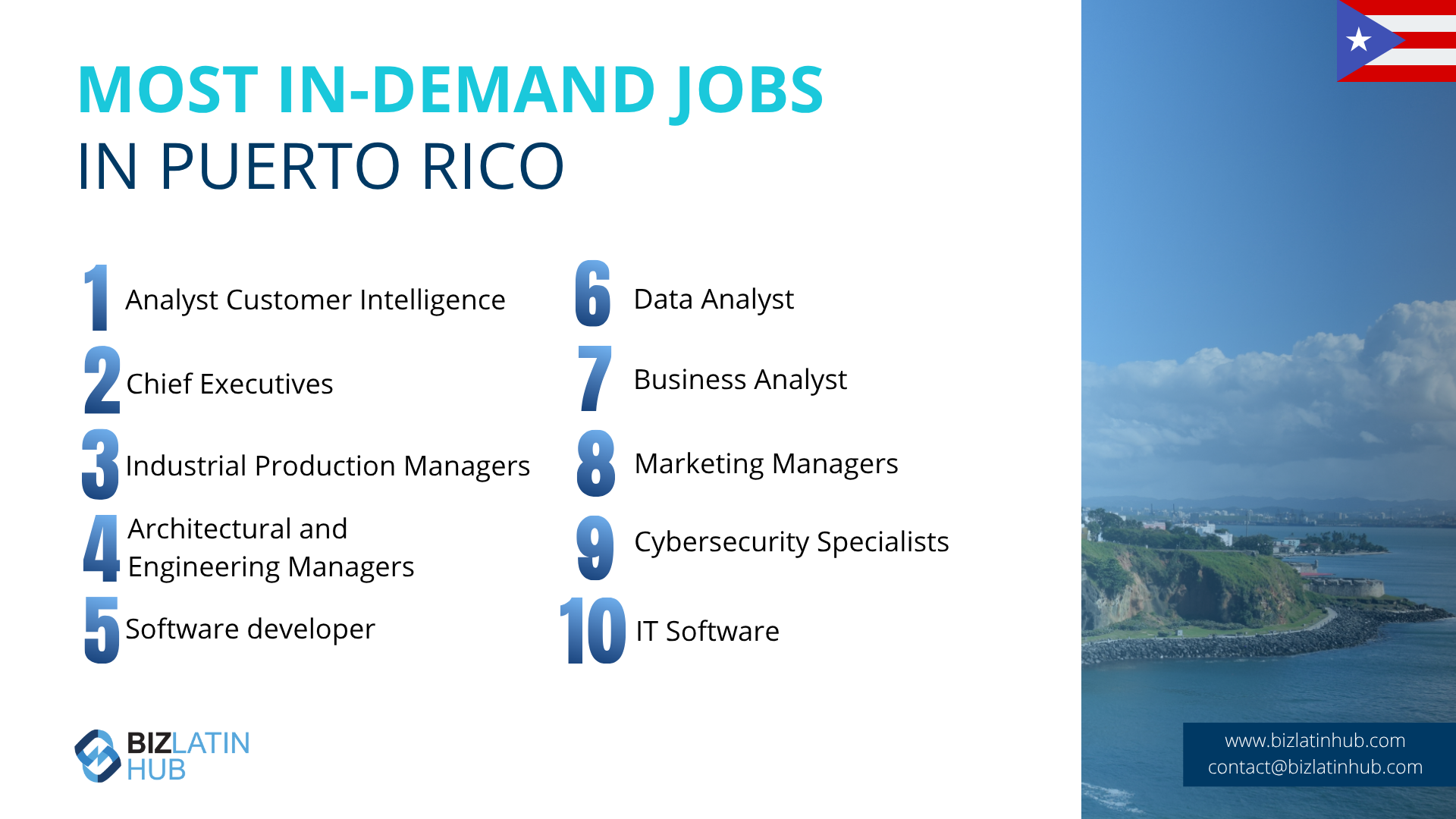
Advantages of Using an PEO for Hiring
A Professional Employer Organization (PEO), also known as an Employer of Record (EOR), offers an efficient alternative to direct hiring. By using a PEO, you can legally onboard employees in Puerto Rico without first establishing a local company. The PEO becomes the legal employer, managing all compliance, payroll, and HR tasks on your behalf.
Partnering with an PEO can expedite the onboarding timeline. This enables employees to begin working within days rather than establishing a legal entity. By utilizing an PEO solution, companies can mitigate risks associated with contractor liabilities. They maintain control over their workforce without the need for a subsidiary or branch office.
Understanding Market Trends and Cost of Living
Rent in Puerto Rico’s city center is affordable. A one-bedroom apartment costs about $400 per month. In the suburbs, a three-bedroom apartment averages $800. Utility bills, including heating, gas, electricity, water, and internet, total around $203.53 monthly.
Eating out is reasonably priced. A meal for one is about $12. Dining with three people in a mid-range restaurant costs approximately $60. The cost of living varies by area, with rent ranging from $300 to $1500 monthly.
Salaries in Puerto Rico range generally range from $20,100 to $89,900 per year. This range reflects various living costs.
The Significance of Local Economic Factors
Puerto Rico’s economy thrives on several sectors. Pharmaceuticals, tourism, manufacturing, and finance contribute to a GDP of $99.9 billion. The agricultural sector, despite being only 0.8% of GDP, is getting more government support. This aims to boost local production and lessen import dependence.
The country is expected to grow economically at 2.5%. Post-Hurricane Maria, Puerto Rico is shifting towards tech industries and startups. This reflects a strategic economic shift.
Puerto Rico’s labor laws align with those of the mainland US, attracting American companies for nearshoring. This is beneficial for enhancing supply chains.
Salary Expectations Based on Industry Trends
Wages in Puerto Rico vary by industry. Here’s a simple comparison:
| Position | Average Wage |
|---|---|
| Administrative Assistants | $10.11 per hour |
| Call Center Representatives | $9.68 per hour |
| Supervisors | $11.37 per hour |
| Tutors | $20.49 per hour |
| Home Health Aides | $100 per day |
| Programmer Analysts | $55,839 per year |
| Software Engineers | $26.35 per hour |
As of January 1, 2024, the minimum wage is $10.50 per hour. All sectors must adhere to this wage, subject to ongoing reviews.
Frequently Asked Questions: Hiring in Puerto Rico
As of Jan 1, 2024, the minimum wage in Puerto Rico is USD $10.50 per hour.
The Christmas Bonus is a mandatory annual bonus that employers must pay to eligible employees. The amount is calculated as a percentage of the employee’s salary, up to a certain maximum.
Employers are responsible for withholding income tax from employees’ paychecks and contributing to several social programs. This includes social security (FICA), Medicare, federal and state unemployment taxes (FUTA and SUTA), and a temporary non-occupational disability insurance.
Puerto Rico is not an “at-will” jurisdiction. This means that after a probationary period, an employer cannot dismiss an employee without “just cause” as defined by law. Dismissing an employee without just cause can result in significant severance payment liabilities.
Biz Latin Hub can help you with hiring in Puerto Rico
At Biz Latin Hub, our multilingual team of company formation specialists has extensive experience in supporting foreign executives when starting a business in Latin America. We offer a complete set of services for your business needs, such as legal, accounting, and recruitment support.
You can rely on us as your main contact for entering and doing business in any of the 18 markets in Latin America and the Caribbean where we operate.
Contact us now for personalized assistance or a free quote on company formation in Latin America.
Learn more about our team and expert authors.

